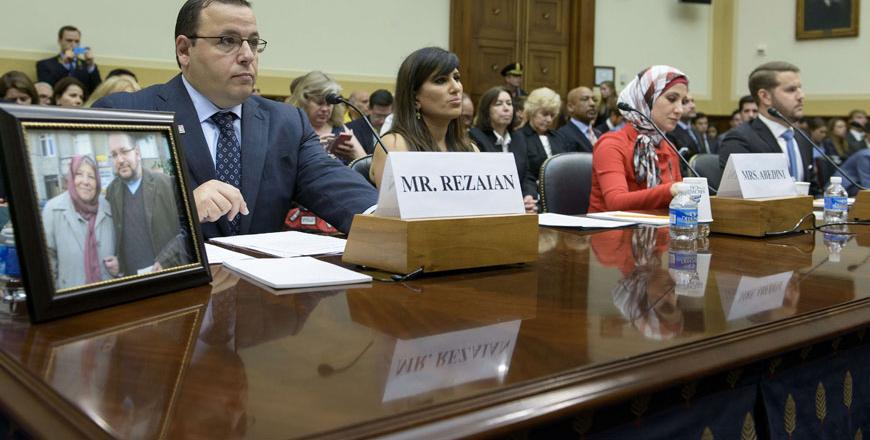You are here
Outside Iran talks, a different cast competes for attention
By AP - Jun 28,2015 - Last updated at Jun 28,2015
VIENNA — Ah, Vienna. City of music. Crown jewel of the Holy Roman Empire. Birthplace of psychoanalysis. Home of the Lipizzaner stallions. And this week, host of the Iran nuclear negotiations.
But along with the foreign ministers, their delegations and a horde of accompanying journalists, another type has decamped to the Austrian capital for the talks: special interest groups with a stake in the outcome.
Amid the Viennese chocolate, churches and chamber music, advocates and opponents of the emerging deal are out in force, as are some of the families of Americans detained or missing in Iran, all hoping to take advantage of the convergence of world-power officialdom and media to press their points.
“We want the Iranian and US governments to know that we are here,” said Sarah Hekmati, whose brother, former US Marine Amir Hekmati, will spend his 1,400th day in an Iranian prison on Monday. “This is an opportune time, and we want to leverage the opportunity.”
Also in Vienna is Ali Rezaian. He’s the brother of Iranian-American Jason Rezaian, The Washington Post reporter who is facing espionage charges in Iran.
Beyond Hekmati and Rezaian, Christian pastor Saeed Abedini is another American imprisoned in Iran. Retired FBI agent Robert Levinson disappeared in the country eight years ago. American diplomats have regularly raised the fate of all four US citizens in talks with their Iranian counterparts, as yet to no avail.
Closer to the heart of the closed-door nuclear negotiations, pro-Israel groups opposing an agreement and arms control and other organisations in favour of one are competing for the time and attention of negotiators, journalists and experts in hotel lobbies, bars and restaurants across the city. The accord, if reached, would curb Iran’s nuclear programme for a decade in exchange for tens of billions of dollars in sanctions relief.
“It’s very important to provide context to what is happening,” said Trita Parsi, the president of the pro-agreement National Iranian American Council, who arrived in Vienna on Saturday. “The organised elements that don’t want this to happen here are very well-funded and have 35 years of experience. A deal is not going to happen or succeed if only one side is represented. There needs to be a counterbalance.”
His reference to an opposition is clear. On the other side are opinion-shapers such as Josh Block, the CEO of The Israel Project, and his senior aide Omri Ceren, well-known in Washington for almost daily ruminations on the nuclear talks that are sent to some 2,000 journalists, policy experts and congressional aides.
“We’re here to provide facts and analysis, and one fact is that the more detail Americans learn about the developing pact, the more people oppose it,” Block said. He called the package “the wrong deal for America, our values and the future of the Free World”.
Nearby in the lobby of the Marriott Hotel, across from the negotiations at the Palais Coburg Hotel, sits Kelsey Davenport, the director for nonproliferation at the Arms Control Association. Her group “supports a verifiable, comprehensive nuclear deal” based on a framework world powers and Iran hashed out in Switzerland almost three months ago.
Cementing the pact “would be a net-plus for nonproliferation”, said Davenport, who arrived in Vienna four days ago. “We are here to follow and report on developments in the talks, consult with parties on both sides of the negotiating table and provide analysis for the media.”
For the Hekmati family, the cause is personal, not political.
Sarah is in Vienna with her husband, Ramy Kurdi, and some star power of her own in television personality Montel Williams, another former Marine who has taken up her brother Amir’s cause at a time when their father, Ali, is dying of brain cancer in Michigan.
“There is a pressing urgency that we feel and we want the world to share,” she said in an interview. “We’re not trying to mix the message, but we do want to take advantage of everyone being here.”
“I just want to make sure that Amir is getting the appropriate amount of public attention,” said Williams, who advocates for veterans on a broad range of matters. On Friday, he delivered a letter outlining father Ali Hekmati’s deteriorating condition to the Iranian embassy in London, hoping it might reach Tehran.
Related Articles
DUBAI — An Iranian court has sentenced The Washington Post reporter Jason Rezaian to a prison term, the state news agency said on Sunday quo
WASHINGTON — Relatives of four Americans held in Iran called on the Obama administration Tuesday to do more to press for their release durin
GENEVA — A Swiss plane carrying three of the four US citizens freed by Iran in a prisoner swap landed in Geneva on Sunday, a US official sai

















